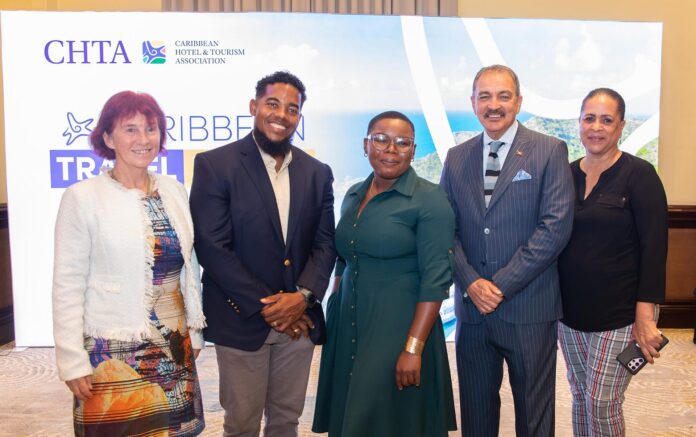As part of the 43rd Caribbean Hotel and Tourism Association (CHTA) Caribbean Travel Marketplace, Antigua and Barbuda hosted a high-level Caribbean Tourism Travel Forum Panel under the theme “Sustainable Tourism in the Caribbean: Charting a Resilient Future” on Monday, May 19, 2025, at Sandals Grande Antigua.
The session was opened by the Honourable H. Charles Fernandez, Minister of Tourism, Civil Aviation, Transportation and Investment, who reminded delegates that the future of Caribbean tourism lies at the intersection of climate resilience and sustainable development.
“As we stand on the brink of the 2025 Atlantic hurricane season, we must confront the hard truth: climate change is no longer a distant threat.
“These are no longer once-in-a-century events,” he stated, referencing the devastation of Hurricane Irma in Barbuda and Hurricane Maria in Dominica.
“Sustainable tourism is not a buzzword. It is a regional imperative.”
It is here, now, and it demands bold, urgent action,” said Minister Fernandez.
“Tourism is our economic lifeblood, but without sustainable practices and environmental stewardship, we risk compromising the very assets that attract the world to our shores.”
Minister Fernandez underscored the need to challenge outdated vulnerability metrics, push for climate justice on the international stage, and invest in green infrastructure that benefits local communities.
He cited Barbuda’s low-density eco-tourism, Redonda’s remarkable restoration, and reef renewal initiatives as blueprints for the wider Caribbean.
He also emphasized the role of workers in the tourism sector as “vital agents of change,” pointing out their unique ability to champion environmental stewardship, educate guests, preserve culture, and drive innovation.
The forum featured a dynamic and solution-driven panel of experts and practitioners at the forefront of sustainable tourism and climate resilience:
Opening the panel of experts was Ambassador Diann Black-Layne, Director of Environment – Antigua and Barbuda.
With over 30 years in environmental policy and project financing, Ambassador Black-Layne spoke on the increasing shift among developers toward Environmental Impact Assessments (EIA) over the last decade.
“The debate between protection and development will always exist,” she acknowledged, “but we are finally having the conversation, and that’s progress.”
She noted the support of the Government of Antigua and Barbuda in strengthening the mandate of the Department of Environment and funding environmental safeguards for major tourism projects.
The discussion followed a real-life example of the importance of conservation and restoration by Johnella Bradshaw, Redonda Ecosystem Reserve Coordinator, Environmental Awareness Group
Bradshaw delivered a passionate and vivid presentation on the transformation of Redonda —from a barren, rat-infested island to a thriving ecosystem. She framed the effort as a triumph of community-based conservation and island resilience.
“From rats to riches,” she said, “Redonda proves what’s possible when we prioritize nature and people at the heart of conservation.”
The passionate story of Redonda was followed by important and illustrative presentation by Ruleo Camacho, Marine Ecologist & Consultant, National Parks Authority.
Camacho emphasized that healthy reefs are not only vital to marine life but are deeply intertwined with economic activity and tourism viability.
“Tourism actions can, and must, support reef restoration,” he said, outlining best practices for sustainable marine tourism, such as using reef-safe sunscreens and avoiding anchoring on coral beds.
He urged developers and tourism investors to fund reef protection and support local conservation NGOs, stating, “We need to take action today for tomorrow, your actions matter. Health reefs support life, livelihoods and future generations.”
Anchoring the discussion in actionable solutions was Dr. Deborah Brosnan, Marine Scientist & Climate Risk Expert, Deborah Brosnan & Associates.
Bringing global perspective, Dr. Brosnan tied environmental resilience directly to investment return, citing case studies where nature-based solutions averted disaster and preserved infrastructure.
“Nature is part of the tourism value chain,” she said. “When we integrate nature-positive solutions, we not only enhance biodiversity but protect communities and deliver economic returns.”
She highlighted:
- A wetland and dune restoration project integrated into a golf course that now supports over 60 bird species and local jobs;
- A $200,000 dune restoration in St. Barths that protected a $90 million development from hurricane damage;
- And OceanShot, a large-scale reef regeneration initiative that created new marine habitats supporting 36 fish species within a year.
The session concluded with a unified message: the future of Caribbean tourism depends on a new model, one that is inclusive, regenerative, and climate conscious.
“This is not just about surviving,” Minister Fernandez reminded attendees.
“It’s about rebuilding stronger, smarter, and more sustainably for today and the future.”


